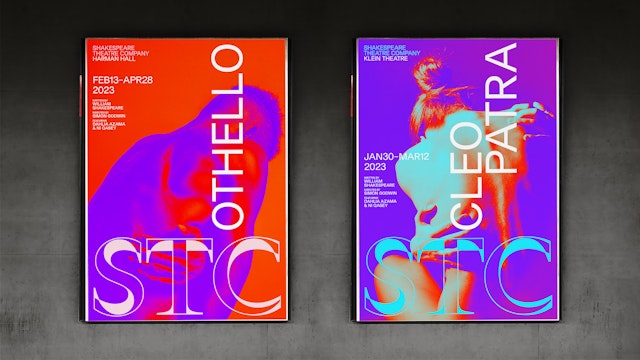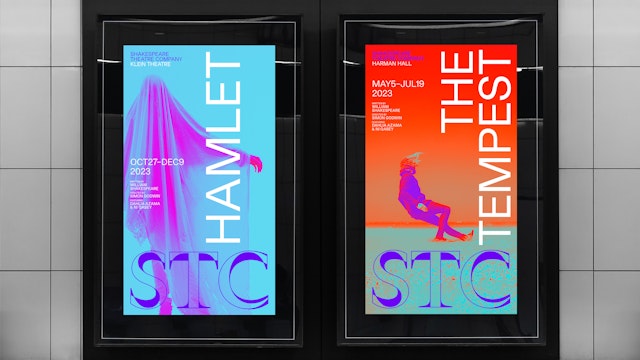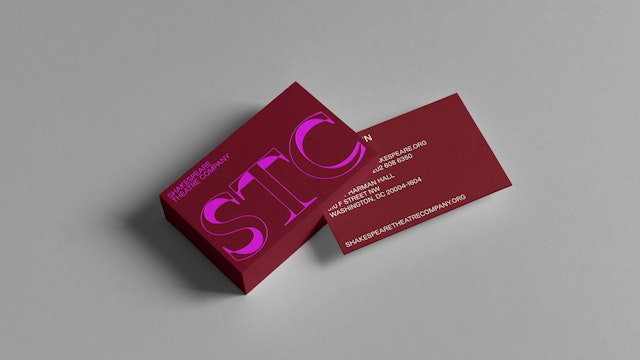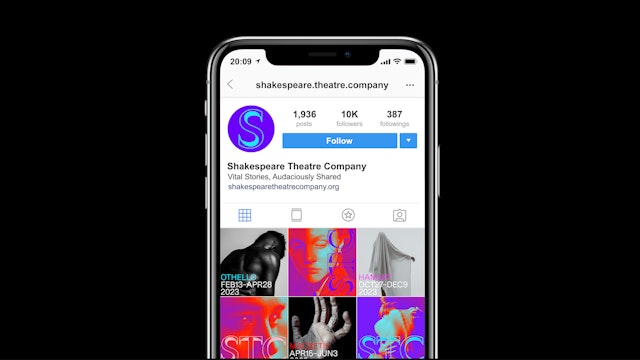With Shakespeare at its core, the Company explores plays of national and international relevancy—with profound themes, complex characters, and heightened language—all through a contemporary 21st-century lens.


Pentagram’s brief was to create a brand identity that expressed the continuing relevance of Shakespeare, enhanced by the contemporary perspective that STC brings to his timeless and universal stories.


Building from STC’s vision of ‘Vital Stories Audaciously Shared’, Pentagram proposed a creative expression around a central idea of interplay between a broad range of dimensions—classic and contemporary, artist and audience, stage and digital, entertaining and learning, intimate and collective.


In contrast to the longer wordmark, STC is used as a shortcut to establish a more approachable connection with audiences and deliberately move away from the more academic or inaccessible perception that many people have of Shakespeare.

Pentagram was asked to rebrand the Shakespeare Theatre Company to signify a new era for Washington DC theatre, under the new leadership of Artistic Director Simon Godwin and Executive Director Chris Jennings.
Established in 1970, the theatre presents high-quality classic productions across a multitude of genres, bringing them to life in a provocative, imaginative and accessible style.
With Shakespeare at its core, the Company explores plays of national and international relevancy—with profound themes, complex characters, and heightened language—all through a contemporary 21st-century lens. Its core belief is that theatre acts as collective storytelling and shared witnessing, and is essentially a force for good.
Well-recognised as an art leader in DC, STC has received more than 100 Helen Hayes Awards, but has also gained a national reputation for its exciting programming and thought-provoking productions. STC is in a unique position, with its productions addressing issues including recent tensions around power and race that are very close to home but still very much relevant on a global scale. It embodies Shakespeare’s much-quoted observation that “All the world's a stage”.
Pentagram’s brief was to create a brand identity that expressed the continuing relevance of Shakespeare, enhanced by the contemporary perspective that STC brings to his timeless and universal stories. Shakespeare’s complex characters such as Macbeth and King Lear provide us with poignant parallels to many modern-day political leaders.
The Company frequently presents Shakespeare’s classic texts with a fresh angle, highlighting topics such as diversity, inclusivity and tolerance whilst reflecting on universal themes including love, power, greed, life, death and many more.
Building on STC’s vision of ‘Vital Stories Audaciously Shared’, Pentagram proposed a creative expression around a central idea of interplay between a broad range of dimensions—classic and contemporary, artist and audience, stage and digital, entertaining and learning, intimate and collective, real and unreal—as a way of reimagining stories from the past for audiences of the future.
Inspired by this interplay, Marina Willer and team designed a brand language centered around a logo overlapping historic and contemporary type which plays on the tension between these two forms.
In contrast to the longer wordmark, the acronym STC is used as a shortcut to establish a more approachable connection with audiences and deliberately move away from the more academic or inaccessible perception that many people have of Shakespeare.
Designed to appeal to a contemporary audience, electric tones and dynamic imagery are combined to bring new light and energy to the classic stories. The support typography is modern, functional and neutral, avoiding the temptation to become illustrative. The photography used throughout ranges from electric tones to more natural everyday imagery that documents the wide-ranging activities of the company.
STC's Simon Godwin adds “Working with Marina and her team has been an inspiring joy. Together they have helped us articulate a relationship between the classical and the contemporary and evolved a visual identity for STC which is audacious and profound. Combining past and present to build a brand for the future, Pentagram has empowered us to look ahead with courage and excitement.”
The power of shared experience means that theatre can create an impact like no other art form, and the new visual language created by Marina and team gives us an evocative and haunting glimpse into the impactful experiences that STC consistently creates.
Office
- London
Partner
Project team
- Hamlet Auyeung
- Rita Desport
- Kate Blewett
- Jeremy Downes
Collaborators
- John Grant (strategy)
- Felix Steindl (web development)
